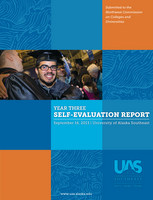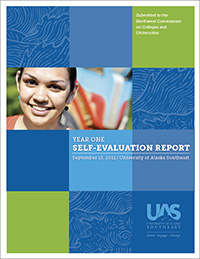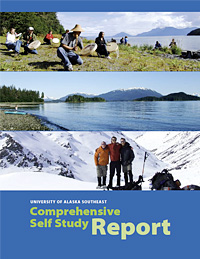Accreditation
The University of Alaska southeast has been accredited by the Northwest Commission on Colleges and Universities (NWCCU) since 1983. This accreditation includes the Juneau, Ketchikan, and Sitka campuses.
Institutional accreditation is regularly reviewed and reaffirmed by the NWCCU. This reaffirmation focuses on a process of continuous improvement. Such improvement aligned with standards occurs through regular reports and site visits conducted by peer evaluators. In addition to these reports and visits, the institution also communicates regularly with the NWCCU about substantive program changes including additions, suspensions, and deletions as well as about changes to institutional leaders and organizational structure.
At UAS, the Provost serves as the Accreditation Liaison Officer (ALO) and is the primary point of contact for information regarding accreditation. Provost Carey can be contacted at 907-796-6486 or uas.provost@alaska.edu.
Year 7 - Mission Fulfillment and Sustainability - Reaffirmation of UAS Accreditation - July 2019.
The University of Alaska Southeast is accredited by the Northwest Commission on Colleges and Universities.
Accreditation of an institution of higher education by the Northwest Commission on Colleges and Universities indicates that it meets or exceeds criteria for the assessment of institutional quality evaluated through a peer review process. An accredited college or university is one which has available the necessary resources to achieve its stated purposes through appropriate educational programs, is substantially doing so, and gives reasonable evidence that it will continue to do so in the foreseeable future. Institutional integrity is also addressed through accreditation.
Accreditation by the Northwest Commission on Colleges and Universities is not partial but applies to the institution as a whole. As such, it is not a guarantee of every course or program offered, or the competence of individual graduates. Rather, it provides reasonable assurance about the quality of opportunities available to students who attend the institution.
Inquiries regarding an institution’s accredited status by the Northwest Commission on Colleges and Universities should be directed to the administrative staff of the institution. Individuals may also contact:
Northwest Commission on Colleges and Universities
8060 165th Avenue N.E., Suite 100
Redmond, WA 98052 (425) 558-4224 www.nwccu.org
Accreditation by the Northwest Commission on Colleges and Universities refers to the institution as a whole. Therefore, statements like “fully accredited” or “this program is accredited by the Northwest Commission on Colleges and Universities” or “this degree is accredited by the Northwest Commission on Colleges and Universities” are incorrect and should not be used.
Specialized Accreditations
Teacher Education
The School of Education at the University of Alaska Southeast received its accreditation by the National Council for Accreditation of Teacher Education (NCATE) which has since been consolidated into the Council for the Accreditation of Educator Preparation (CAEP).
This accreditation covers initial and advanced teacher preparation programs. However, the accreditation does not include individual education courses that the institution offers to P-12 educators for professional development, relicensure, or other purposes. CAEP is recognized by the Alaska Department of Education and Early Development, the U.S. Department of Education and the Council for Higher Education Accreditation to accredit programs for the preparation of teachers and other professional school personnel.
Health Information Management
The Health Information Management Associate Degree program is accredited by the Commission on Accreditation for Health Informatics and Information Management Education (CAHIIM).
Medical Assisting Certificate
The University of Alaska Southeast is accredited by the Commission on Accreditation of Allied Health Education Programs (CAAHEP) upon the recommendation of the Medical Assisting Education Review Board (MAERB).
Commission on Accreditation of Allied Health Education Programs (www.caahep.org)
9355 113th St. N, #7709
Seminole, FL 33775-7709
727-210-2350
Accreditation Council for Business Schools and Programs (ACBSP)
The Certificate, Associate, and Baccalaureate degree programs in the UAS Department of Business and Public Administration have been accredited by ACBSP, the Accreditation Council for Business Schools and Programs.

Additional Information
September 2014 - UAS Report to Board of Regents on Institutional and Programmatic Accreditation
Our Year Seven Self-Evaluation report is now available online.
A site visit by a team of Northwest Commission on Colleges and Universities (NWCCU) evaluators occurred April 24-26, 2019.
The NWCCU votes on UAS accreditation status June 19-20, 2019.

UAS 2013 Year Three Self Evaluation Report
Below are the table of contents for the 2013 Year Three Self Evaluation Report. Below is a list of bookmarks for navigation within the PDF document above.
Helpful Links

UAS 2011 Year One Self Evaluation Report
Below are the table of contents for the 2011 Year One Self Evaluation Report. (5.1Mb). There is an extensive list of bookmarks for navigation within the PDF document above. To read the NWCCU's response to the 2011 Self Study Report, click here.

UAS 2009 Self Study Report
Below are the table of contents for the 2009 Self Study Report. (1.8Mb). There is an extensive list of bookmarks for navigation within the PDF document above. To read the NWCCU's response to the 2009 Self Study Report, click here.